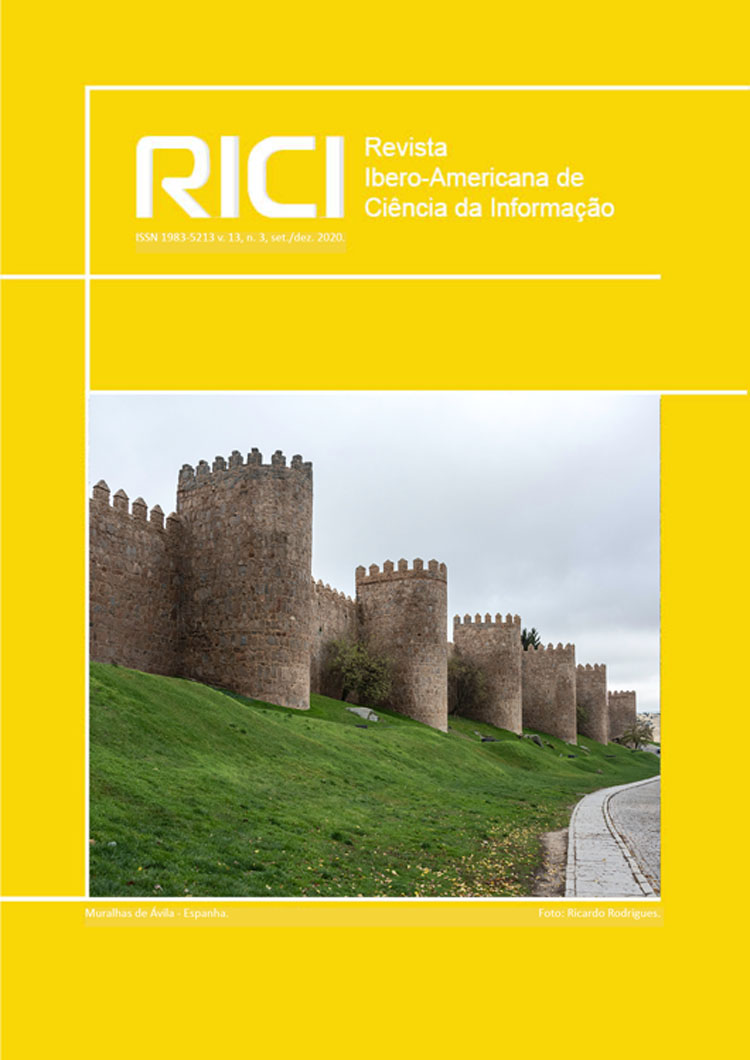Emerging patterns and trends in the international scientific structure of the “hate speech” domain
DOI:
https://doi.org/10.26512/rici.v13.n3.2020.33017Keywords:
Hate speech, Metric studies, Scientific structureAbstract
The aim of this study is to identify the patterns and trends in the international scientific structure on hate speech. It revealed the network of scientific collaboration, the structure of co-citations, the areas of knowledge linked to the topic, and the subjects that define the trends in the domain. We retrieved 441 articles that include the expression "hate speech" in the title, abstract or keywords field from the Web of Science Core Collection for the period 2009-2018. The collaboration and co-citation networks were modeled using Bibexcel version 2017 and Pajek for the analysis and visualization. Latent Dirichlet Allocation was used as a natural language processing technique for the title, abstract and keywords fields. The results show a significant increase in publications since 2013 and a peak in 2018. The Social Network Analysis showed that despite the incipient presence of hate speech in the scientific literature, there is a prominent theoretical core of publications on the topic which is frequently cited by the international scientific community. There is also a core of works that is recognized as highly relevant in the theoretical, conceptual and methodological approaches to the study of hate speech.
Downloads
References
BLEI, D. M.; NG, A. Y.; JORDAN, M. I. Latent Dirichlet allocation. Journal of machine Learning research, v. 3, p. 993-1022, Jan 2003.
BROWN, A. Hate Speech Law. London: Routledge, 2015.
CHETTY, N.; ALATHUR, S. Hate speech review in the context of online social networks. Aggression and violent behavior, v. 40, p. 108-118, 2018.
DOBROVOLSKYI, H.; KEBERLE, N. On Convergence of Controlled Snowball Sampling for Scientific Abstracts Collection. En: 14th International Conference on Information and Communication Technologies in Education, Research, and Industrial Applications (ICTERI), p. 179-192, 2018. Disponible en: http://ceur-ws.org/Vol-2105/10000179.pdf. Acceso: 10 oct. 2019.
ESQUIVEL ALONSO, Y. El discurso del odio en la jurisprudencia del Tribunal Europeo de Derechos Humanos. Cuestiones constitucionales, n. 35, p. 3-44, 2016. Disponible en: http://dx.doi.org/10.22201/iij.24484881e.2016.35.10491. Acceso: 1 nov. 2019.
HANNEMAN, R.A.; RIDDLE, M. Components. In: Introduction to social network methods. Riverside, CA: University of California, Riverside, 2005. Disponible en: https://faculty.ucr.edu/~hanneman/nettext/C11_Cliques.html#Components Acceso: 10 oct. 2019.
HJØRLAND, B. Domain analysis in information science: eleven approaches”“traditional as well as innovative. Journal of Documentation, v. 58, n. 4, p. 422-462, 2002.
HJØRLAND, B. Domain analysis. Knowledge Organization, v. 44, n. 6, p. 436-464, 2017.
HJØRLAND, B.; ALBRECHTSEN, H. Toward a new horizon in information science: Domain”analysis. Journal of the American Society for Information Science, v. 46, n. 6, p. 400-425, 1995.
ISASI, A. C.; JUANATEY, A. G. El discurso del odio en las redes sociales: Un estado de la cuestión. Ajuntament de Barcelona progress report. 2017.
LECY, J D.; BEATTY, K. E. Representative literature reviews using constrained snowball sampling and citation network analysis 2012. Disponible en: http://dx.doi.org/10.2139/ssrn.1992601 Acceso: 11 oct. 2019
OLMEDA-GÓMEZ, C. Visualización de información. El profesional de la información, v. 23, n. 3, p. 213-219, 2014.
OVALLE-PERANDONES, M. A.; OLMEDA-GÓMEZ, C.; PERIANES-RODRÃGUEZ, A. ARS y redes de colaboración científica. Em: DEL FRESNO, M. P.; MARQUÉS-SÁNCHEZ; SÁNCHEZ-PAUNERO, D. (Eds.). Conectados por redes sociales: introducción al análisis de redes sociales y casos prácticos. Barcelona: Editorial UOC, p. 219-245, 2014.
PRICE, D. D. S. A general theory of bibliometric and other cumulative advantage processes. Journal of the American society for Information Science v. 27, n. 5, p. 292-306, 1976.
REVENGA SÁNCHEZ, M. Libertad de expresión y discursos del odio. Madrid: Universidad de Alcalá, 2015.
SMALL, H. Co”citation in the scientific literature: A new measure of the relationship between two documents Journal of the American Society for Information Science, v. 24, n. 4, p. 265-269,1973.
SMIRAGLIA, R. Domain analysis for knowledge organization: tools for ontology extraction. Chandos Publishing, 2015.
SONNENWALD, D. H. Scientific collaboration. Annual review of information science and technology, v. 41, n. 1, p. 643-681, 2007.
STURGES, P. Limits to freedom of expression? The problem of blasphemy. IFLA Journal, v. 41, n. 2, p. 112-119, 2015.
WASSERMAN, S.; FAUST, K. Social network analysis: Methods and applications (Vol. 8). Cambridge University Press. 1994.
Downloads
Published
How to Cite
Issue
Section
License
Copyright (c) 2020 Mirelys Puerta-Díaz, María-Antonia Ovalle-Perandones, Daniel Martínez-Ávila

This work is licensed under a Creative Commons Attribution 4.0 International License.
Copyright Notice
Authors who publish in this journal agree to the following terms:
- Authors retain copyright and grant the journal right of first publication with the work simultaneously licensed under the Creative Commons Attribution License 4.0, allowing the sharing of work and recognition of the work of authorship and initial publication in this journal.
- Authors are able to take on additional contracts separately, non-exclusive distribution of the version of the paper published in this journal (ex.: distribute to an institutional repository or publish as a book), with an acknowledgment of its initial publication in this journal.
- Authors are permitted and encouraged to distribute their work online (eg.: in institutional repositories or on their website) at any point before or during the editorial process, as it can lead to productive exchanges, as well as increase the impact and citation the published work.
















